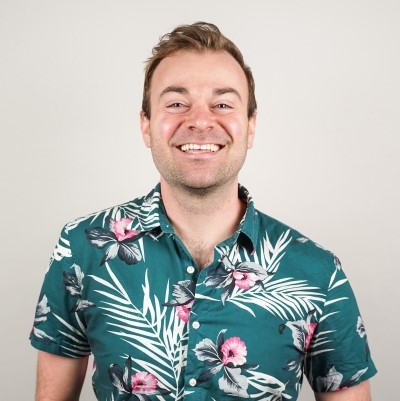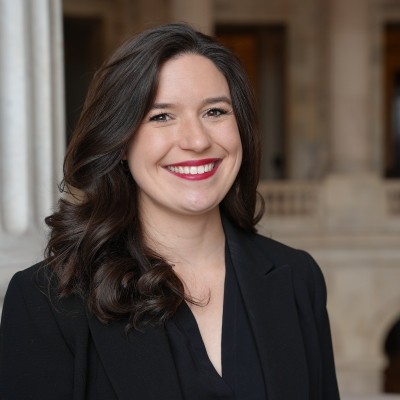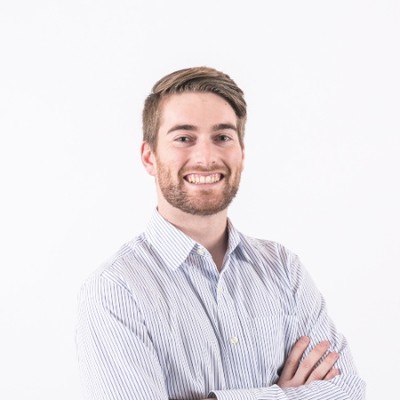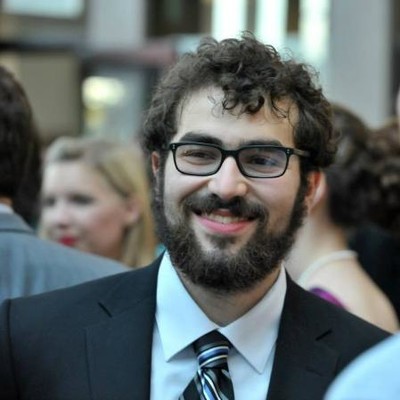Collaborative Climate Innovation
Trienens Institute Co-Executive Director Ted Sargent shares insights on Northwestern's role in driving research, partnerships to expand carbon removal initiatives
Catching up with four Trienens Institute certificate graduates to see where sustainability and energy has taken them in their careers
The Paula M. Trienens Institute for Sustainability and Energy recently celebrated 10 years as an Institute (after an initial 5-year launch as an ‘Initiative’) with a transformational $25 million naming gift in June of 2023.
With so much at stake after every passing climate-fueled year, it’s natural to stay affixed on the horizon, looking forward to the programs and support that the Trienens Institute will bring to the Northwestern community of faculty and student scholars. Nonetheless, the timing of the gift also happened to align with the 10-year anniversary of its first undergraduate Sustainability and Energy Certificate recipient.
The certificate is an academic path that allows students of any discipline to integrate their studies with an education in climate science, public policy, and energy systems. In the program’s history, nearly 150 Northwestern undergraduate alumni have earned the certificate, with its popularity expanding every year, keeping apace of the explosion of career and postgraduate opportunities.
The program’s seven-course core and elective requirements complement students’ declared area of study, exposing them to a broad range of policy and science topics that will empower them for a career in sustainability and energy. Certificate classes are also popular options to help students meet distribution requirements across natural sciences, human and behavioral science, and ethics.
In celebration of this milestone, the Trienens Institute caught up with some of the program’s earliest graduates. Get to know Casey, Lauren, Stephen, and Mike, all part of the Northwestern class of 2015, and learn about what role sustainability and energy have played in their career paths, regardless of industry.

Northwestern path: BS Materials Science
Currently: Global director of sustainability, SC Johnson's Lifestyle Brands
As the SC Johnson Lifestyle Brands global director of sustainability, Casey oversees the sustainability programs for Method, Mrs Meyer’s Clean Day, Babyganics and Ecover. This includes setting goals, long-term strategy, and measuring targets related to packaging, sustainable formulation development, waste in manufacturing, carbon accounting and reduction. He also manages supply chain certifications related to responsible land use.

Northwestern path: BA Environmental Science, Environmental Policy and Culture minor
Currently: Counsel, US Senate Committee on Agriculture, Nutrition, and Forestry
As an attorney at the US Senate Committee on Agriculture, Nutrition, and Forestry, Lauren works on federal policy and legislation at the nexus of agriculture, conservation and climate, and local and regional food system sustainability—specifically, she drafts legislation and contributes to oversight of the US Department of Agriculture and the Environmental Protection Agency.

Northwestern path: BA Environmental Science
Currently: Principal, Hyde Park Angels
As part of Hyde Park Angels (HPA), a Chicago-based venture capital firm, Stephen manages investments across a variety of industries (including climate and energy) and leverages the expertise of over 140 members to support HPA’s founders in building innovative businesses.

Northwestern path: BA Chemistry, Economics Minor
Currently: Postdoctoral Fellow, Columbia University
Mike’s work at Columbia focuses on addressing escalating energy consumption and carbon emissions using information and communication technologies. His research specifically involves developing two-dimensional magnetic materials at the interface of chemistry and physics for potential integration into more energy-efficient "spintronic" devices.
Casey: I learned problem solving from my Northwestern education and that's a necessity in a nascent field like this one. Sustainability teams are frequently lean and that means you need to be strategic and resourceful to solve the large-scale challenges that impact everything from a business’s operations to its product and supply chain. I also loved the foundational understanding of the environmental field that I got through my ISEN [Trienens Institute] courses; this helped build my own view of what environmental progress should look like and this continues to shape conversations that I have with business leaders.
Lauren: Northwestern was where I took my first classes in US Environmental Law and International Environmental Law & Policy! The interdisciplinary breadth of classes allowed me to cultivate a strong scientific foundation while still exploring my deep interest in how federal and international law and policy address scientific issues related to climate change, environmental conservation, sustainability, and equity in our globalized food system.
My junior year, I was lucky enough to receive both a Weinberg Summer Undergraduate Research Grant and an additional Sustainability Grant from ISEN [the Trienens Institute] to support my field research with the Field Museum of Natural History. That research took me to the Peruvian Amazon to study sustainable palm forest management and palm fiber handcraft production with local artisans in three ribereño communities that served as the basis for my honors thesis.
Northwestern provided me many mentors on campus, at the Field Museum, and at the Chicago Botanic Garden that helped me develop a research mindset and skills that I continued to use daily in my work as an attorney seeking to find legislative and policy solutions for the evermore complicated issues that I love to work on.
Stephen: While I knew I was interested in energy and sustainability, I was unfamiliar with entrepreneurship and venture capital until I went to Northwestern. The coursework that I took gave me exposure to what it means to start a business and how venture capital enables these businesses to grow quickly. However, the blending of these two interest areas, sustainability and venture capital, came together in a graduate-level seminar I took my senior year called “Powering the Future,” run by ISEN [the Trienens Institute]. The seminar was a combination of students across schools and experience levels to dig deep into energy topics such as distributed energy resources and regulation. It was during the seminar that I became interested in using venture capital to drive sustainable outcomes, an area I remain passionate about today.
Mike: Quite broadly, my time at Northwestern showed me the huge scope of ongoing energy research, which played a huge role in my decision to pursue a career in science. But beyond that, one common take away from my coursework, research, and other activities at Northwestern was the importance of having people in different disciplines coming together to work on problems in the sustainability and energy space. As a researcher, this concept has motivated me to seek out lab environments and research projects that draw from many different fields (chemistry, physics, materials science, and engineering) and to find opportunities to collaborate as much as possible. I think this mindset played a big role in inspiring me to move away from what I studied in graduate school (inorganic chemistry) and into a much more interdisciplinary postdoc project.
Casey: You've really got to conserve your passion and energy in this field for the corporate battles you think you can win. And progress feels really good!
Lauren: You need a strong sense of patience and persistence in this line of work. Many environmentalists want to get results quickly, which is understandable given the gravity of the impacts we face under any climate change scenario at this point. But finding solutions to any given environmental problem is far more complicated than almost any one person fully grasps. If we are to achieve true environmental sustainability, it has to be the largest group project in the world. That means that the universe of voices and interests engaged in this work is vast and only growing larger. Cultivating a sense of curiosity, the ability to listen well, and the patience to always continue to learn the many things that you do not yet know is the most important skill that a person can develop in this field.
Stephen: Stay in touch with your friends and celebrate the wins. Life and work are much more enriching when you have people around you that you like. Celebrating the wins is important because life is about taking risk—sometimes they work, sometimes they don't, but when they do, that's a special moment.
Mike: One major lesson I've learned since graduation is the difficulty in moving from a lab-scale result to an industrially viable one. Even once you've found a solution that outperforms an existing product, you need to convince yourself that it can be cost-effective, scalable, and integrable with existing infrastructure before considering turning it into a startup. Having watched several different startups grow out of the lab that I worked in during graduate school, I've learned that it can be an extremely long and winding path to bring a product to market, which was hard for me to grasp until I watched it unfold. But I think that's made it even more impressive for me to see all the new startups emerging in the sustainability and energy space every year.
Casey: I love when my projects get to go beyond our own company walls and can give back to communities. In the last 5 years, I've worked on a project to build rural solar mini grids in Myanmar and worked to recycle plastic that was polluting coastal communities in Southeast Asia into new bottles for products. Hearing the stories of individuals impacted by my work makes all the challenging parts worth it.
Lauren: The first major piece of legislation I worked on as a committee counsel was, at the time Build Back Better, part of which became the Agriculture Title of the 2023 Inflation Reduction Act (IRA). The IRA investments in that title included $19.5 billion over five years for climate-smart agriculture through USDA’s conservation programs, $5 billion for wildfire management and urban and community forestry, and $13.2 billion that represented the largest investment in rural energy since the Rural Electrification Act of 1936. I’m incredibly proud to have been part of the dedicated team of committee staff that got that title through the parliamentary process and passed into law.
As that title of the IRA has been implemented by USDA, we have seen overwhelming interest from farmers, foresters, and rural electric cooperatives who are excited to take advantage of new opportunities to work, with the support of the federal government, on adopting practices that are better for the climate. I am excited to see how those funds continue to support sustainability efforts across the country in the coming years.
Stephen: The main driver of HPA's success is the platform we've developed called our People First Approach. Essentially, this is how we support our companies, by tapping into the domain and functional expertise within our membership. A key portion of that is our Deal Lead Program: Deal Leads are members that serve as the main liaisons between HPA and our companies, and the program was developed to enable the Deal Leads' success. I put the Deal Lead Program together in my second year at HPA and have continued running the program, building an infrastructure that has led to numerous sales, hires, and introductions across our 80+ investments.
Mike: I can't share all of the details just yet, but I've recently been working on a project that started by testing how a certain layered material would behave as a cathode. It turned out to not be very good as a battery material, but the way that the material's properties change when lithium ions are inserted between its layers has turned out to be very exciting. It's a project that's drawn on a lot of different areas of expertise that I've built up across my time in different labs (even all the way back to my time at Northwestern), so in many ways, it feels like the culmination of all my time as a researcher.
Casey: The field of sustainability is full of passionate people working toward a common goal and I'm constantly surprised to learn of new businesses in this space (in some cases that have been operating for decades). There are so many ways to combat a climate crisis and I'm looking forward to seeing more organizations activated in fighting the climate crisis. On a personal note, I'm looking forward to helping manage the next generation of leaders in this space—there's nothing more energizing to me than helping passionate people to join this field.
Lauren: I am as fascinated by complicated questions of how to achieve sustainable development at the intersection of agriculture and the environment as I have ever been. This work is difficult and deeply rewarding, but it has allowed me to cross paths with truly incredible people in incredible parts of the world—from the Amazon rainforest to Montreal to Vermont and now to D.C. I am so excited to see where this interest continues to take me and who I will get the opportunity to work with along the way.
Further, I’m optimistic about the future of working on agriculture and sustainability. Even five years ago, there wasn’t much interest politically in talking about agriculture’s climate impacts. Today, that conversation is a robust one that is focused on developing workable, nature-based climate solutions.
Stephen: I'm fascinated to see how two things evolve over the next decade, one personal and one global. Personally, I'm very interested to see how the venture capital industry changes after a roller coaster the last few years. There is more money and more people working in VC than ever before, but I'm curious to see if this cottage industry can continue its maturation into a significant asset class like public equities or credit. Globally, there is more momentum than ever to address climate change driven by years of advocacy and weather events that have brought the models to reality. However, the transition from the miracle properties of fossil fuels will be rougher than many expect so it'll be incumbent on governments, corporations, and other groups to help smooth that shift.
Mike: It feels like we're on the precipice of a major shift in terms of electrification of infrastructure. With the huge surge in electric vehicles and recent breakthroughs in battery technologies beyond lithium-ion, we've never been closer to having affordable grid-scale storage, which should continue to propel investment in renewable energy sources. Seeing practical uses of science that's been developed in just the past few years is pretty exciting—and as a researcher, extremely motivating!
Curious about the Trienens Institute’s Sustainability and Energy Certificate? Visit the Sustainability and Energy Certificate page.